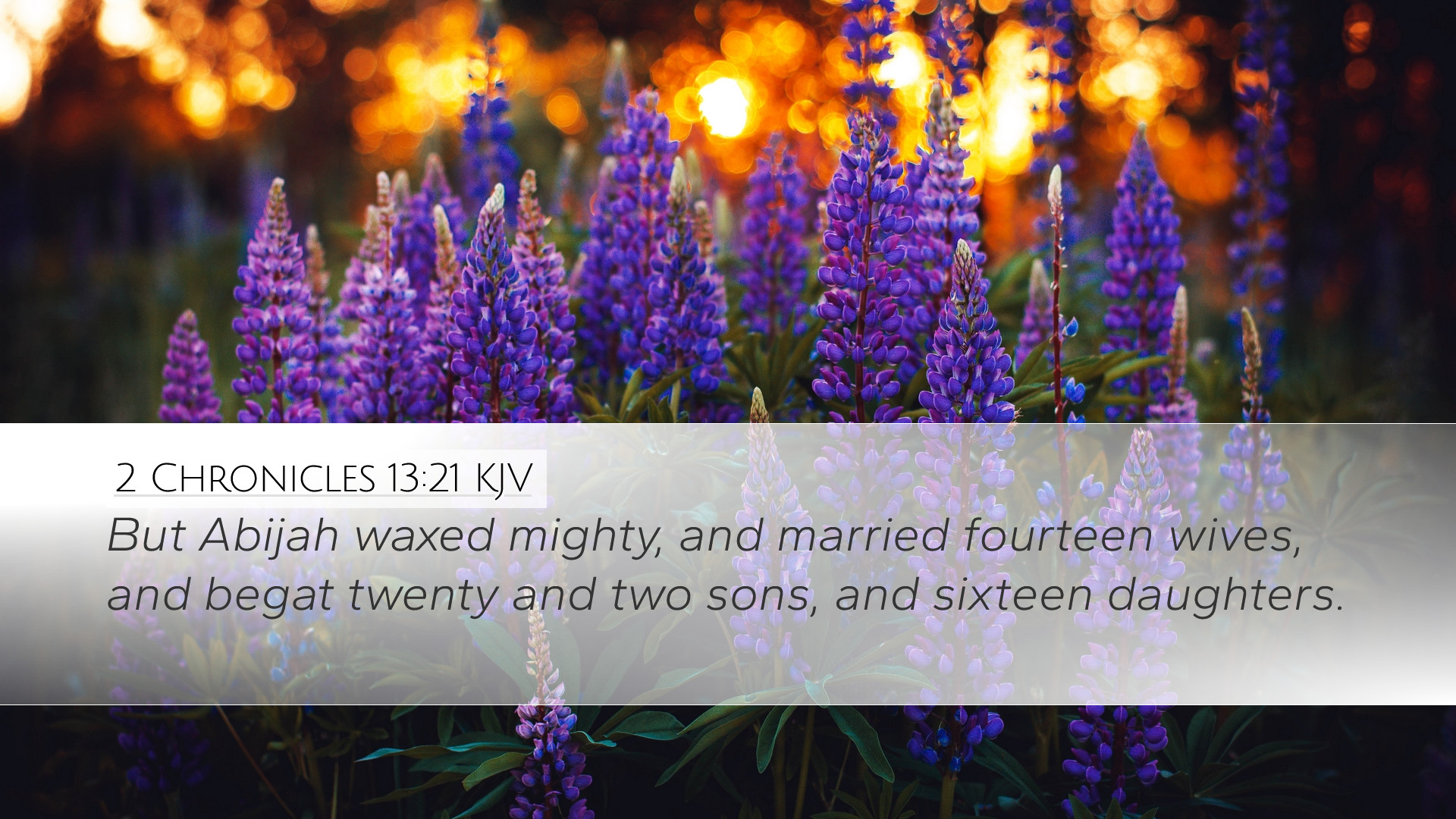Commentary on 2 Chronicles 13:21
2 Chronicles 13:21 states: "But Abijah waxed mighty, and married fourteen wives, and begat twenty and two sons, and sixteen daughters."
Historical Context
In this chapter, we see the continuation of the narrative concerning the divided kingdom of Israel and Judah. Abijah, the son of Rehoboam, ascends to the throne of Judah and engages in a crucial battle against the kingdom of Israel led by Jeroboam. This verse concludes the account of Abijah’s reign, reflecting on his personal and political growth.
The Ascendancy of Abijah
According to Matthew Henry, Abijah’s rise is noted for its remarkable strength and sovereignty. His military confrontation with Jeroboam not only solidified his position but also demonstrated his reliance on God, where he declared the faithfulness of God to David’s lineage. Despite being outnumbered, Abijah proclaimed the superiority of Judah due to its covenant with God.
Marriage and Alliances
The verse reflects Abijah's polygamy, as he took fourteen wives. Albert Barnes emphasizes that Abijah's marriages were likely strategic alliances meant to strengthen his kingdom and secure loyalty among neighboring tribes. In the ancient Near Eastern context, such marriages were common practices for kings aiming to unite alliances and fortify their rule.
However, this practice must be examined critically, as Adam Clarke notes that polygamy can lead to familial discord and tension, seen in the subsequent conflicts that arose in the lineage of David. In the broader biblical narrative, these marriages brought both political and spiritual consequences, ultimately leading to divisions within Israel.
Generational Legacy
Abijah fathered twenty-two sons and sixteen daughters, a significant number indicating fruitful progeny and the continuation of his lineage. Matthew Henry suggests that the large family could be viewed as a blessing from God, reflecting divine favor upon Abijah’s reign, especially when contrasted against the turmoil that characterized the reigns of many of his predecessors and successors.
Yet, from a theological perspective, the multitude of children also raises questions about the spiritual health of the nation. Drawing insight from Albert Barnes, one can argue that while Abijah had numerous children, the spiritual legacy he left behind should be examined in light of their fidelity to God and adherence to covenantal principles.
Theological Implications
One of the significant consequences of Abijah's reign and his personal choices is the reflection on how leaders in the Bible faced moral and ethical challenges. Adam Clarke points out that despite his success, the question remains about the integrity and righteousness of those who followed him. The verse indirectly invites reflection on the standards of leadership, morality, and family structure in the context of God’s covenant people.
Application for Today's Leaders
-
Spiritual Leadership: Leaders today can learn from Abijah's reliance on God during his military confrontations. Abijah recognized that his strength came not from his military might but from the covenant relationship with God.
-
Marital Decisions: The wisdom of choosing alliances and maintaining ethical standards in relationships should guide contemporary leaders. Reflecting on the potential pitfalls of polygamy illustrates the need for integrity in personal and communal relationships.
-
Legacy and Influence: The generational legacy Abijah left invites pondering how today’s decisions impact future generations. Pastors and leaders must consider their influence on family and community and strive for righteousness that will benefit those who follow.
Conclusion
Ultimately, 2 Chronicles 13:21 encapsulates a multifaceted view of Abijah's reign, marrying historical narrative with spiritual lessons. As Christians, the story reminds us of the importance of fidelity to God, the weight of leadership decisions, and the continuous impact these choices have on subsequent generations. Matthew Henry, Albert Barnes, and Adam Clarke combined provide a complex yet enlightening understanding that encourages further exploration and application of these timeless truths.


